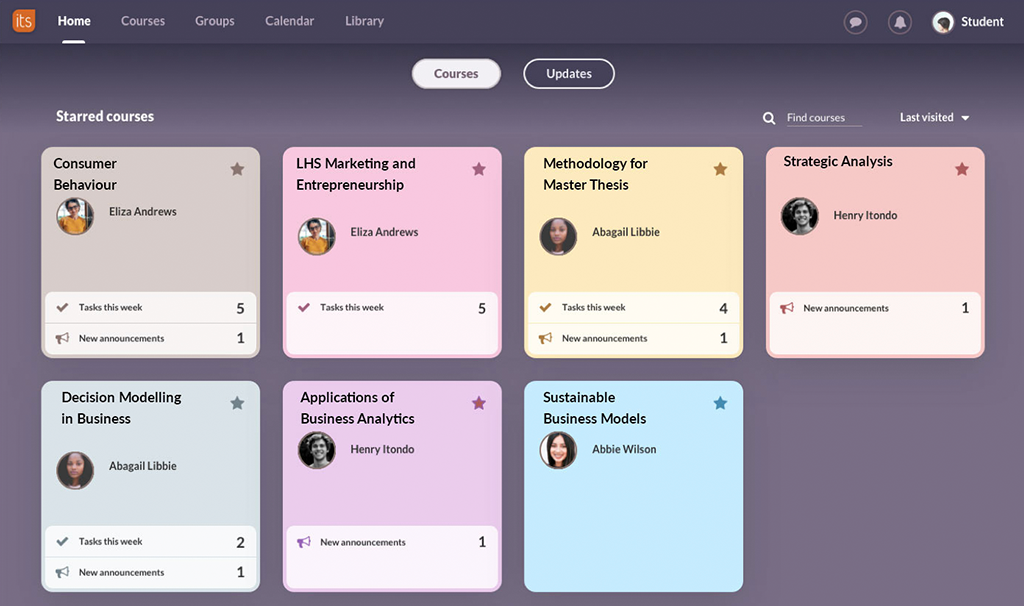When it comes to lifelong learning, we are entering a new world of possibilities for students and professors. Especially during the COVID-19 pandemic, many people took the time to recalibrate, reset and reinvent – and we entered the Great Resignation era during which over 47 million people voluntarily left their jobs in the US alone, according to a Pew Research analysis. The report said the resignation rate in the eurozone was around 2.7% in the first quarter of 2022.
Motivated by changes in life paths and more available time, the COVID-19 pandemic ignited virtual forms of student mobility across the world, according to UNESCO. Society began to understand that to create change in personal and professional life, there were more options than traditional education.
According to Mckinsey, from 2011 to 2021, the number of learners attending massive open online courses (MOOCs) increased from 300,000 to 220 million. Between 2012 and 2019, the number of hybrid and distance-only students at traditional universities increased by 36%, while COVID-19 accelerated that growth by an additional 92% in 2020.

What are the benefits of Continuing Education programs?
Continued Learning programs provide learners with cost-effective, expeditious options beyond a degree program. During our webinar Vision of Lifelong Learning in the Nordics, Professor Magnus Nohr from Østfold University College affirmed that more people are taking advantage of asynchronous education opportunities – choosing to study when it fits their busy schedules.
This trend is growing in Finland. Another panellist from our webinar, Professor Tuija Arola from Kouvoula Vocational Institute in Finland, said that this is a very important movement in Finland.
"Having the right technology is essential for allowing people to study regardless of time and place, and technology supports people with learning difficulties. Professors need to know what students need before they know themselves. Putting students at the centre is key.”
For some, the opportunity to learn high-demand skills is more important than attending a well-known institution. Nearly half of respondents to Mckinsey’s learner survey said they would only consider paying for education programs that have an expected positive return on career outcomes, while just 21% indicated they would only attend a “top-ranked school.”
“What pleases students is that those courses can reach so many people when they take place online. We have identified that accessibility enables learners to use whatever technology they have, like a mobile phone, without having to carry something bulkier, less convenient,” says Professor Michael Keaney, a senior lecturer at Metropolia Business School and our third webinar panellist. “This creates an environment where students can take their classes whenever they want and have time, being so much more accessible in the learning process,” concludes Professor Keaney.
Online education can help adults of all ages quickly gain the skills needed to fill positions and improve their career trajectories.
Expectations of students must be met and are likely to be increased. They know what technology can deliver, so why aren’t we using it?"
Professor Keaney, Metropolia Business School
It is more than career change, it is life-changing

When people want to change careers, they need to acquire new skills. Professor Arola says that Kouvoula Vocational Institute’s main purpose is to produce a skilled workforce. 60% of students are adults that are currently working, are looking for career-changes and are eager for Continuous Learning.
Arola sums it up, “People want a better work-life balance.”
Another group that’s interested in Lifelong Learning is those who are out of the workforce. Professor Keaney says this is a great opportunity for people who are looking to re-enter the workforce, for whom a 4-year bachelor’s degree might not be the best path. They want something more fast-tracked and tailored to their needs.
Let’s talk about the learning experience
Online and offline classes require different sets of skills, and this is difficult for many teachers. Some may be good at producing videos, while others need help with tools to improve the digital learning process.
Professor Nohr is tech savvy and excels at the art of online classes. He says it’s important to look at how we can use disruptive tools to deliver high-quality education.
We must remember that online teaching has different success factors than traditional campus education. Professor Nohr has been developing online courses for almost 10 years and says he learns what works and what doesn’t by asking students. “Using student feedback always helps improve the quality of your work and resources. When course materials are all in the LMS, it provides a lot of data, so you can see what materials they are using and revise or delete the ones they aren’t."
Greater demand and higher standards suggest that students are growing savvier about the return of their educational investments, and this is exactly why professors need to understand how to meet their needs.
An LMS like itslearning is key to a successful course

itslearning in action - courses on the platform
Teaching online demands a lot: being on camera, learning different tools while fulfilling course objectives, engaging students and meeting their expectations. “Even though students are online, they should feel part of the learning community, with interaction and feedback from teachers, as well as counselling if needed,” explain Professor Arola. “It is important to have the right tools to make sure students are really learning.”
That’s where an LMS can help. itslearning can help you structure both real-time and self-paced courses. When you use the Planner, for example, it is easy to see the next steps. When students have easy access to their tasks, they will waste less time trying to find out what to do.
Our Test Tool can also be a great way to measure students’ progression. Quick multiple-choice tests after class, as an exit ticket, can give you a good overview of the class understanding.
For students, the ePorfolio is a great tool to highlight the best work of each course, and share it with interested parties when needed.
itslearning is a good partner, listening to our needs and adjusting"
Professor Tuija Arola, Kouvoula Vocational Institute
With multiple features to give students a better learning experience, we invite you to reach out to our experts for a free demo.
To learn more about Lifelong Learning, watch our webinar ‘Vision of Lifelong Learning in the Nordics’ on demand. Visit our webpage Higher Education in the Nordics for more valuable content.
